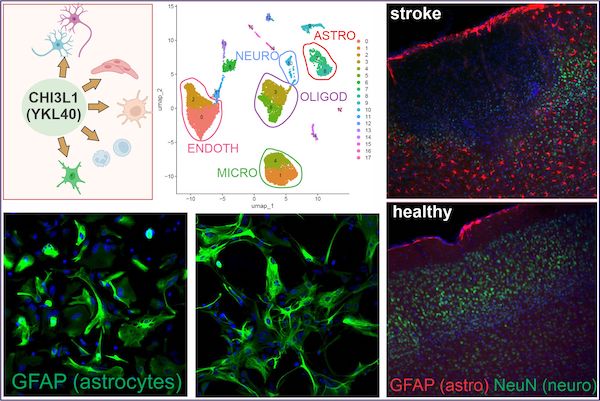Dr hab. Anna Malik’s project – “CHI3L1 (YKL40) in ischemic stroke: impact on brain microenvironment and motor function recovery”

18 03 2025
Dr. hab. Anna Malik is conducting the project “CHI3L1 (YKL40) in ischemic stroke: impact on brain microenvironment and motor function recovery”, which has received funding in the Sonata Bis 14 programme of the National Science Centre (NCN).
Stroke is a serious health issue and one of the top causes of death and long-term disability in adults. The most common type is called ischemic stroke, which happens when blood flow to a part of the brain gets blocked. This blockage reduces oxygen and glucose supply, leading to death of neurons and activation of other cells of the brain, including astrocytes. Currently, treatment options for stroke mainly focus on restoring blood flow, but they often fail to prevent lasting brain damage. This damage can lead to a range of disabilities, affecting movement, vision, speech, and swallowing. After a stroke, the brain undergoes inflammation and tissue remodeling that have great impact on regeneration and rehabilitation.
Astrocytes, a type of brain cells, play a key role in responses to brain pathologies, including stroke. After an ischemic stroke, astrocytes become active and gather around the damaged area. They release important substances that can influence how other cells in the brain respond to injury, which has important consequences for the regeneration after stroke. One of the substances released by astrocytes is called chitinase-3-like protein 1 (CHI3L1), also known as YKL40. For a long time, CHI3L1 was only seen as a sign of inflammation, but recent research shows it may play a much larger role in brain health. It appears to affect various processes, including inflammation and the growth of new blood vessels, which are important for recovery after a stroke.
While higher levels of CHI3L1 in the blood seem to be associated with worse outcomes after a stroke, it is still debated whether blocking CHI3L1 could help improve recovery. Thus, in the research project, the researchers aim to explore whether blocking CHI3L1 can aid recovery after a stroke. They will investigate how CHI3L1 influences cells in the brain after ischemic injury and how astrocytes release this protein. They hypothesize that CHI3L1 released by astrocytes affects the healing processes after a stroke. They propose that blocking CHI3L1 might help avoid excessive inflammation and support better healing. To test these ideas, they will use both animal model of stroke and cell culture models. They will investigate the impact of a CHI3L1 blocker on various levels, including recovery of motor skills after stroke. They will employ various techniques, like observing improvement of motor skills in animals after a stroke and analyzing the properties of the cells in the brain.
In summary, by combining advanced research techniques and experimental models, the researchers hope to uncover how CHI3L1 influences the brain’s response to a stroke and the recovery. This knowledge could be crucial for finding new treatment options for stroke patients in the future. A postdoc, a PhD student and a technician will be recruited in frame of this project.
Dr hab. Anna Malik is a neurobiologist with an expertise in the molecular basis of brain disorders. She specializes in the mechanisms of intracellular protein sorting and vesicular trafficking, and the relevance of these processes for the functional integrity of the brain. Her current research focuses on the processes governing phenotypic polarization of astrocytes and microglia and their role in shaping brain microenvironment in the diseased brain.
Dr hab. Malik is a pharmacist by training. She completed her PhD in molecular biology at the Nencki Institute and the International Institute of Molecular and Cell Biology in Warsaw. Her research experience includes a postdoctoral training in Max-Delbrueck Center in Berlin. Currently, she leads the Cellular Neurobiology Research Group at the Faculty of Biology, University of Warsaw, Poland.